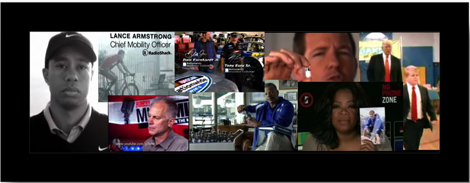 Nonprofits get excited when a celebrity wants to join their advisory board or endorse their campaign. But do celebrity endorsements across different channels work these days? It depends.
Nonprofits get excited when a celebrity wants to join their advisory board or endorse their campaign. But do celebrity endorsements across different channels work these days? It depends.
If a celebrity has a deep connection to an issue and it's common knowledge then celebrity endorsements can certainly benefit nonprofit campaigns. For example, before helping to launch the ONE campaign, Bono was known for his activism around Africa and AIDS. Having him as one of the main faces of the ONE campaign made perfect sense. He has been able to bring enormous attention to ONE and the issues they work on. Bono has also helped raise a lot of money, generated impressive earned media, and introduced other celebrities to ONE. 
“Credible authority can take many forms — friends you trust, colleagues, experts at nonprofits and yes, sometimes celebrities. The key is using a celebrity who makes sense within the context of your organization and delivers on your brand promise, said Alia Scott Mckee of Sea Change Strategies. “If you are a human rights group, the Dalai Lama is right up your alley, while Cameron Diaz, not so much.”
Activists and donors rely more on their personal and social networks today, not celebrity endorsements. In fact, according to Ad Age, celebrities used in TV ads have a low impact on consumers. The 2010 Celebrity Advertisements: Exposing a Myth of Advertising Effectiveness, report showed less than 12% of ads using celebrities exceeded a 10% lift, and one-fifth of celebrity ads had a negative impact on consumers. “Today's consumer is more likely to be influenced by someone in their social network than a weak celebrity connection.”
Campaigns Can Go Viral In Smaller Networks
With so much data across the web, campaigns usually don’t just go big and viral with over 2M views on YouTube in a day. “People often wait until a number of friends or trusted sources have promoted an idea before promoting it themselves,” according to a recent Cornell University study.
The structure of a social network is what matters, whether it’s comprised of friends or of like-minded strangers who follow Ashton Kutcher on Twitter. It’s the smaller, more personal networks that have more influence - more than celebrity endorsements or the size of the group. “A smaller, more connected network might be more likely to respond to a recommendation from one of its own valued members,” said Jure Leskovec, an assistant professor of computer science at Stanford in a NYT interview in connection to the Cornell study.
For the nonprofit sector that means that the race to get the most amount of followers on Twitter or the most fans and “likes” on FB is not what nonprofits should be focusing on. It’s the quality of the people in our networks that matter. These are the people that we should be fostering better relationships with; further educating them on our issues; and giving them the tools to advocate for our causes.



COMMENTS